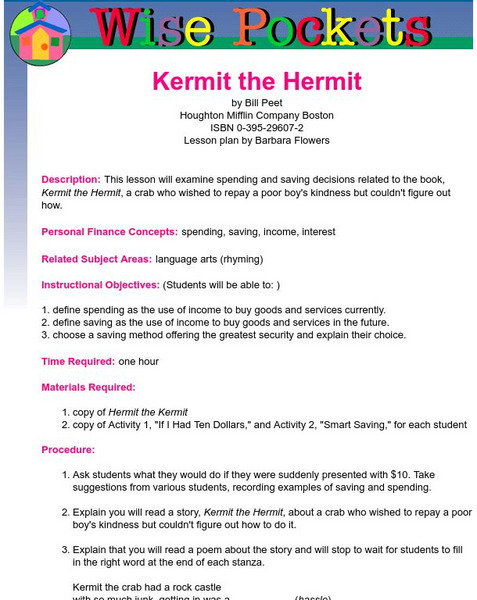Council for Economic Education
Econ Ed Link: Multipliers and the Mystery of the Magic Money
Students learn about the purpose of the reserve requirement, how money is "created" in the economy through fractional reserves, and how the Federal Reserve uses the reserve requirement and loans to correct economic instability.
Council for Economic Education
Econ Ed Link: Is Globalization a Dirty Word?
Is globalization a dirty word? Well not according to a recent study conducted by the World Bank. The report, entitled Globalization, Growth, and Poverty: Building an Inclusive World Economy, makes the case for globalization as a method...
Council for Economic Education
Econ Ed Link: It's a Not So Wonderful Life
In this lesson students learn about banks and banking. The study the fractional reserve system, and the role the Fed plays in the money creation process.
Council for Economic Education
Econ Ed Link: You Can Bank on This! (Part 4)
This lesson deals with credit, and wraps up this unit on finance.
PBS
Pbs News Hour Extra: What Does the Fed Do?
This collection of lesson materials focuses on how the Federal Reserve System works. Students will learn how banking systems work and what a fractional reserve banking system is.
Council for Economic Education
Econ Ed Link: The Road to Emerald City Is Paved With Good Intentions
'The Wizard of Oz' is perhaps the most popular film ever made. Generations of families have enjoyed this classic tale of Dorothy's struggle to return home from a faraway land. What is not well known, however, is that 'The Wonderful...
Council for Economic Education
Econ Ed Link: Agent Pincher: P Is for Penny or Where Did Money Come From?
What if we woke up tomorrow and found that there were no more pennies? Or what if we found that money had disappeared altogether -- not only from our pockets but from banks, stores and all the other places where we would expect to find...
Council for Economic Education
Econ Ed Link: A Penny Saved
Learners will read the comic book, "A Penny Saved" published by the New York Federal Reserve Bank. Students will make the information relevant through projects, graphic organizers, teacher instruction, and problems.
Council for Economic Education
Econ Ed Link: Calculating Simple Interest
How do banks calculate the amount of interest paid on a loan? In this activity, students will view a Livescribe Pencast to learn how to find the dollar amount in interest that is due at maturity. This activity uses different time periods...
Council for Economic Education
Econ Ed Link: u.s. Senate Mulls Over Bankruptcy Legislation
During the week of September 20, 1998, the US Senate agreed to debate a bill (S 1301), intended to make it more difficult for people of means to use bankruptcy to walk away from debt. Those who could pay at least 20 percent of their...
Council for Economic Education
Econ Ed Link: Buy a Bond, James: A Lesson on Us Savings Bonds
This site is extremely informative for teaching children the value of saving money. "You will write a persuasive letter telling why people use savings bonds as a way to save their money."
Council for Economic Education
Econ Ed Link: Clickety Clack, Let's Keep Track!
This lesson will show learners the importance of keeping track of their savings.
Council for Economic Education
Econ Ed Link: What's My Interest?
Learners explore the concept of interest by means of two activities. The first, a simple activity with jellybeans, introduces the concept of interest accruement, and the second, a practical, "real world" activity, reinforces the concept...
Council for Economic Education
Econ Ed Link: Giving Credit
This life lesson will prepare students for the world of credit. "In this lesson, you will analyze the creditworthiness of people who want to borrow. You will also learn how to identify ways to establish your creditworthiness."
Council for Economic Education
Econ Ed Link: Mobile Phones Matter
A lesson exploring whether or not mobile phones matter when it comes to financial management and financial decision-making.
Council for Economic Education
Econ Ed Link: A Penny Saved Is a Penny at 4.7% Earned
There are lots of ways to receive income, and lots of ways to spend it. In this EconomicsMinute you will develop two budgets to help you decide how to allocate your income. Assuming you do not love making dollar bill rings.
Council for Economic Education
Econ Ed Link: Climbing the Savings Mountain
Students discover how saving money can be compared to a mountain climb. The climb can be fast or slow, safe or hazardous, scenic or thrilling. You will find out that there is more than one way to get to the top!
Council for Economic Education
Econ Ed Link: Using an Excel Checkbook
Students will use a spreadsheet to enter checkbook transactions and reconcile.
University of Missouri
University of Missouri St. Louis:wise Pockets: Kermit the Hermit
This is an elementary level lesson that deals with spending, saving, income, and interest. Requires the book Kermit the Hermit by Bill Peet. Includes detailed lesson plan along with procedures and activities.
University of Missouri
University of Missouri: Wise Pockets: Berenstain Bears' Trouble With Money
Using a Berenstain Bears' book, students are introduced to concepts such as spending, goods, services, income, saving, and interest. Lesson is detailed and has good activities. Includes questions about the story that teach students about...
Council for Economic Education
Econ Ed Link: Should I Use Cash or Credit?
This is a lesson presented by EconEdLink that delivers the dilemma of cash or credit. Includes background information, a problem-solving grid, and great questions.
Council for Economic Education
Econ Ed Link: Climbing the Savings Mountain
Check out this lesson plan to learn how to develop a savings plan that is right for you.










